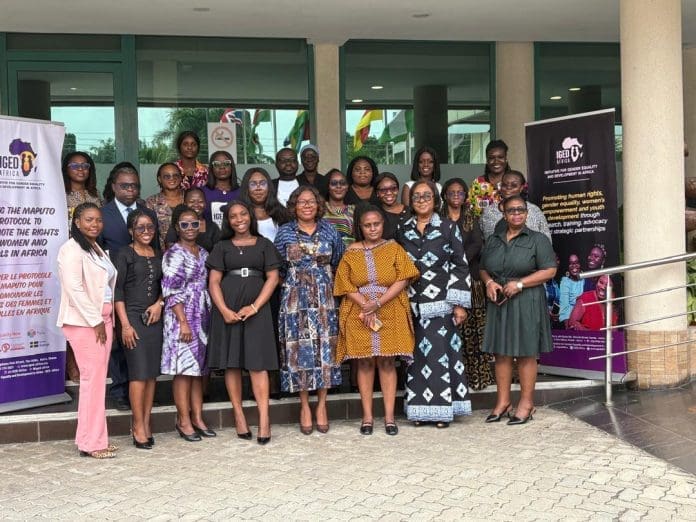By: Joseph Wemakor
Civil society organizations launched a comprehensive campaign this week to accelerate stalled family law reforms that have left Ghanaian women without crucial legal protections for over three decades.
The two-day stakeholder workshop, which began Tuesday at the Alisa Hotel, brought together legal experts, women’s rights advocates, and policymakers to address longstanding legislative delays affecting spousal property rights and inheritance laws. The initiative represents the most significant coordinated push for family law reform since Ghana’s return to democracy.
The workshop runs from September 10 to 11, 2025, organized by the Initiative for Gender Equality and Development in Africa in collaboration with the Solidarity of African Women’s Rights Coalition hosted by Equality Now, focusing on three critical pieces of legislation that have languished in parliamentary processes for years.
Sylvia Horname Noagbesenu, Executive Director of IGED-Africa, described the gathering as addressing issues that affect every Ghanaian citizen. “As long as you are a human being, you belong to a family,” she told participants, emphasizing the universal relevance of family law reforms that have been delayed despite constitutional mandates dating back to 1992.
The workshop centered on advancing three key legislative priorities that civil society leaders say represent fundamental human rights issues rather than merely technical legal matters. The Spousal Property Rights Bill has remained stalled for over a decade despite clear constitutional directives, while the Interstate Succession Amendment Bill 2022 continues to face parliamentary delays that leave widows and children vulnerable under current discriminatory frameworks.
Esther Waweru, Senior Legal Advisor at Equality Now, highlighted Ghana’s identification as a priority country during the Kampala Regional Strategic Consultation on Family Law Reform in Africa held in March 2024. She challenged participants to move beyond legislative achievements to meaningful implementation, particularly regarding the newly passed Affirmative Action Act 2024.
“Despite Ghana’s progress, women continue to face gender inequality in critical areas, including political participation and family law,” Waweru said, grounding her remarks in Ghana’s commitments under the Maputo Protocol, which mandates equal rights in marriage, property ownership, and inheritance.
Sheila Minkah-Premo, Convener of the Affirmative Action Law Coalition, led discussions on implementing the landmark 2024 legislation while addressing enforcement challenges including inadequate public education, institutional resistance, and the need for robust accountability mechanisms. Her presentation highlighted the gap between legislative victories and practical change for women across Ghana.
The current intestate succession framework received sharp criticism from Lois Aduamoah-Addo, Program Manager for Access to Justice at WiLDAF, who described existing laws as discriminatory against widows and children. She emphasized how customary and religious practices often compound legal disadvantages facing women in inheritance disputes.
Participants shared testimonials demonstrating how inadequate family law protections affect women across Ghana’s diverse communities, from rural farming areas to urban centers. The discussions revealed how gaps between statutory, customary, and religious legal systems create confusion and vulnerability for women seeking legal recourse in family disputes.
The workshop emphasized aligning Ghana’s national laws with regional obligations under the Maputo Protocol, which has been ratified by 46 out of 55 African Union member countries as of August 2025. Advocates described this alignment as both a legal requirement and moral imperative for protecting women’s rights.
Civil society leaders called for developing a comprehensive national action plan that would track legislative progress on family law bills, amplify women’s voices in reform processes, and mobilize grassroots support for implementation. The plan would also demand accountability from government officials for timely responses to legislative priorities.
The initiative comes as Ghana’s affirmative action law was passed in November 2024, representing significant progress in gender equality legislation. However, advocates stress that legislative achievements must translate into measurable improvements in women’s daily lives and legal protections.
Organizers expressed optimism that the workshop’s second day would produce concrete strategies for advancing Ghana’s family law reform agenda through sustained civil society coordination. The gathering represents unprecedented collaboration among pan-African feminist organizations, international NGOs, and local advocacy groups working to address systemic discrimination in family legal frameworks.
The workshop underscores growing momentum across Africa for comprehensive family law reforms that align national legislation with continental human rights instruments. Ghana’s experience is being watched closely by advocates across the region as a potential model for coordinated civil society engagement in legislative reform processes.
Participants emphasized that successful family law reform requires bridging divides between different legal systems, intensifying public education campaigns, and maintaining sustained pressure on government institutions to honor constitutional commitments to gender equality and women’s rights protection.
Source: newsghana.com.gh











